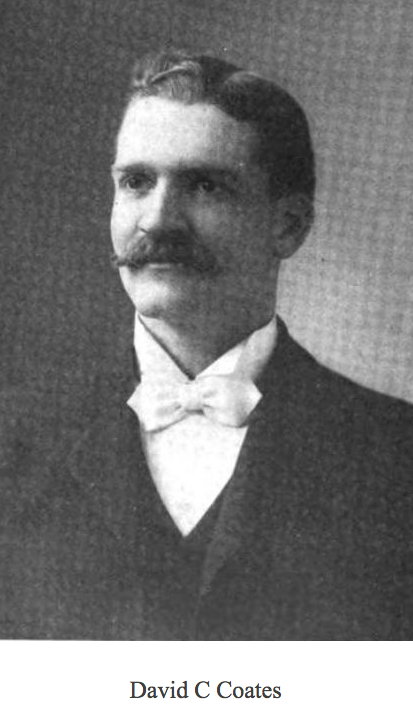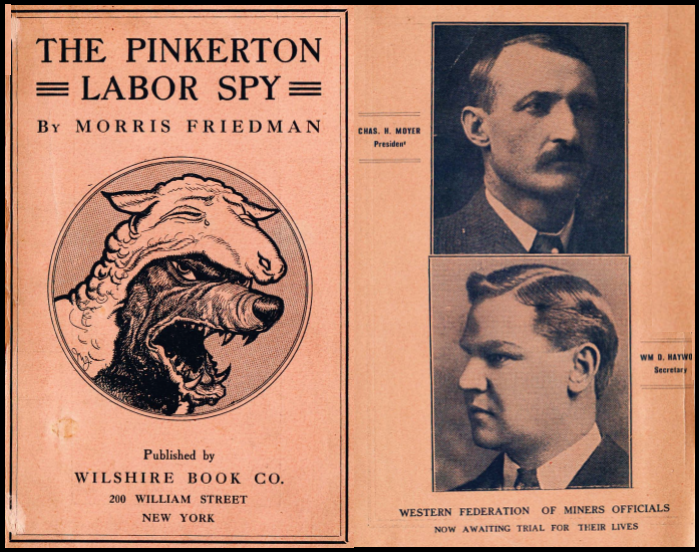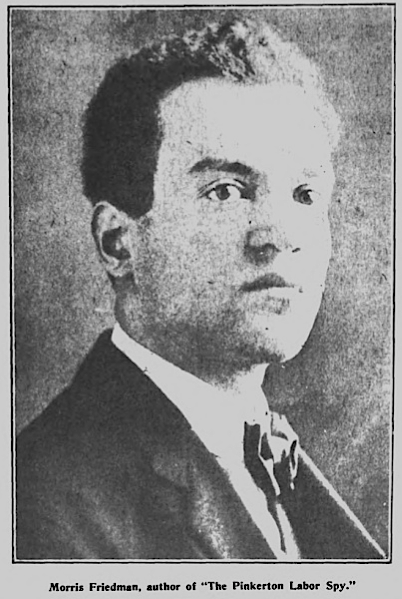powers of privilege will not go
to keep the workers in slavery.
-Mother Jones
Hellraisers Journal, Saturday July 13, 1907
Boise, Idaho – Ida Crouch-Hazlett Reports from Haywood Trial
From the Montana News of July 11, 1907:
Reporting on the amazing testimony of Morris Friedman, author of The Pinkerton Labor Spy, Ida Crouch-Hazlett states that the testimony of this intrepid former employee of the Pinkerton Detective Agency has “crystalized [the] gathering sentiment” in favor of the defense. The article, “The Tide Turning,” states in part:
—–
[Friedman] reached the climax of the effect he created when Borah accused him of stealing the copies of the detective correspondence. With his voice thrilling with the sense of the justice that had impelled him to the sacrifices he had undergone to give his knowledge of the work of these inhuman fiends to the world, he indignantly repelled the charge:
When I discovered the crimes they were committing, and the wicked plots they were attempting to fasten on the machinists, the United Mine Workers, and the Western Federation, I considered these matters the property of the various unions, and that I was restoring it the rightful owners.
The ringing words electrified the court-room, and the ranks of the Federation broke into cheers, which the guards forgot to silence.
[Photograph added. See full article below.]
Almost the entire first page of this edition of the News is devoted to coverage of the trial by Crouch-Hazlett:

See also, an untitled story with dateline: Boise, July 6, regarding the most interesting testimony of David C. Coates, former Lieutenant-governor of Colorado, “prominently identified with the labor movement of Colorado for many years.” In fact, Fellow Worker Coates was a delegate to the founding convention of the Industrial Workers of the World.
And for more on the testimonies of the many defense witness who have come to Boise to lend their support to Fellow Worker Big Bill Haywood, be sure to read the following articles, also from the front page:
-“Bull-Pen Experience-Miners Tell Interesting Stories of the Russian Methods Used by Mine Owners and Citizens’ Alliance,” dateline: Boise, July 4.
-“Lawbreakers Shown Up-Witnesses Tell of Violence and Outrages Committed by Militia and Detectives in Colorado,” dateline: Boise, July 2.
Morris Friedman, Witness for the Defense:
The Tide Turning
—–Morris Friedman Tells the Jury
Something Interesting-
How the Spies in the Unions OperateBoise, July 1.
A wonderful change has come over popular sentiment in the last few days in regard to the status of the trial. The public has been made aware that there are two sides to this case. Incident by incident the defense witnesses that have come to the stand have placed before the daily auditors the almost unbelievable tale of the atrocities and injustice perpetrated by the employers of labor upon the men that do their work.
The bitter facts and their pregnant cause, the alignment of all the forces and authority of existing society in favor of the exploiter and against the man that works-these things that the socialists have been telling over and over for half a century-are here brought into the white light that beats upon a labor trial, are spread to the four winds of the earth, and all the world is learning them.
The prosecution, and “respectable” society generally, have come to see that these working men have had ample cause for resentment and revolt, even had they been goaded into many indiscretions themselves.
Conservative respectable society was prone to look upon the allegations of the miners as mere fables with no existence in realty whatever. But such indisputable evidence has been give, even by the prosecution’s witnesses of the awful conditions that have prevailed in the mining camps, that those who have listened have learned new and tragic pages in the history of the busy world about them, and became wiser, if not sadder men and women.
Even the prosecution lawyers have been visibly affected by the tales of many of the men, and one in a position to know said recently that even Borah did not want to see the men hang.
All of the venom and hatred seems to have dropped out of the attitude of the attorneys for the state in handling the case. They have learned things-things that they never knew about what the men have endured in these labor conflicts. It is evident to all that these witnesses are telling of facts that occurred, and that the last few days there has been little cross-examination.
Morris Friedman has been the man that crystalized this gathering sentiment. He has come to meet the occasion with the convictions of the ancient prophets of his race. His pale serious face, his thorough and quick familiarity with every detail connected with the task which he had so conscientiously taken upon himself, his firm, strong, fearless and palpably truthful answers which he gave to all questions have forced hatred and opposition to the background and brought respect and attention even into the faces of the Pinkertons, who were undergoing his terrible arraignment.
The attorneys for the state soon saw that they were dealing with a remarkably keen and capable intellect, one that steadfastly baffled their coarse and untrue insinuations by the fervor of the humanitarian purpose that inspired him.
He reached the climax of the effect he created when Borah accused him of stealing the copies of the detective correspondence. With his voice thrilling with the sense of the justice that had impelled him to the sacrifices he had undergone to give his knowledge of the work of these inhuman fiends to the world, he indignantly repelled the charge:
When I discovered the crimes they were committing, and the wicked plots they were attempting to fasten on the machinists, the United Mine Workers, and the Western Federation, I considered these matters the property of the various unions, and that I was restoring it the rightful owners.
The ringing words electrified the court-room, and the ranks of the Federation broke into cheers, which the guards forgot to silence. A moral purpose had taken the place of the brute passion that had hitherto dominated the issues.
Emerson says, “A heroic deed makes the bystanders to shine,” and all who heard the words of the young Hebrew were lifted into an atmosphere vibrating with those mighty principles which the soul of man has found and revered amid the chaos of his conflicts.
The opposite side are now admitting the conspiracy of the mine owners against the union men. Even the Boise papers reflect a great change, and are printing articles showing the lawless conditions against the liberties of the working class that prevailed in Colorado. This is introducing an entirely new element into the public consideration of the case, and furnishes most overwhelming corroboration of the allegations the defense has made from the beginning.
As Darrow read the Friedman exhibits to the jury these plain farmers learned what they had never suspected before that a dog watch is set on every union act. And the monumental care taken to undermine the Western Federation shows the monumental importance that the employers attach to this organization. These already are guns, conspiracy and counter-conspiracy, the conflicts of the revolution.
Friedman will never be forgotten in the ranks of the Federation. His copies of the detective correspondence are complete documentary evidence of all that the union men have been trying to get before the public these many years. It is all here-jails, sleuths, every figure. The Pinkerton reports give minute details of every act. Here was the report of General Reardon that the Independence explosion was a good thing because things had been too quiet in the district; of the Pinkerton that was made deputy sheriff and told to kill any union man that spoke to him; of the rope with the noose thrown to Sheriff Robertson with the demand for his immediate resignation, because he stood for the law in the Cripple Creek district as against capitalist anarchy, and was friendly to the union men; of the fight at the union hall till the miners besieged by a howling mob and caught in a death trap displayed a white flag at one of the windows.
Orchard’s confession isn’t in it with these reports for admissions of murder.
The prosecution looks glum, gloomy and peculiar. They know they’re licked. They have evoked the mighty genius of the class struggle, and they stand aghast at the specter they have raise.
The defense is feeling elated. Darrow looks across at Borah and laughs as revelation after revelation is made, Borah hangs his head and looks sick. It is no laughing matter with him.
Haywood looks bright and confident. His mother now and then has her arm around his neck.
One interesting feature of Friedman’s reports was the activity of the Pinkertons among the Machinists, United Mine Workers, and Western Federation of Miners. In the strike of the machinists at Omaha the Pinks did all they could to continue the strike, an agreement was reached over the head of Burke.
IDA CROUCH-HAZLETT.
———-
[Photograph added.]
SOURCES
Montana News
(Helena, Montana)
-July 11, 1907
“Owned and Published by the
Socialist Party of Montana”
http://chroniclingamerica.loc.gov/lccn/sn84024811/1907-07-11/ed-1/seq-1/
Proceedings of the First Convention of the
Industrial Workers of the World, June 27-July 8, 1905
(Search: “david c coates”)
https://books.google.com/books?id=ifRQAQAAMAAJ
IMAGES
Pinkerton Labor Spy by Friedman, BBH, Moyer, 1907
http://moses.law.umn.edu/darrow/documents/Pinkerton_Labor_Spy.pdf
David C Coates
https://play.google.com/books/reader?id=1wejAAAAMAAJ&printsec=frontcover&pg=GBS.PA292-IA2
HMP, Morris Friedman, Pinkerton Labor Spy, Wilshires, June 1907
https://babel.hathitrust.org/cgi/pt?view=image;size=100;id=iau.31858037309105;page=root;seq=154
See also:
Tag: Haywood Trial of 1907
https://weneverforget.org/tag/haywood-trial-of-1907/
Darrow Collection: Haywood Trial
http://moses.law.umn.edu/darrow/trials.php?tid=3
Trial Transcripts, Haywood Trial, Volume 5, pp 2124 – 2839
June 25, 26, 27, 28, 29, 1907.
Note: pdf, slow to load.
http://moses.law.umn.edu/darrow/documents/Vol_5_Haywood_Transcript_p_2124_2839.pdf
Trial Transcripts, Haywood Trial, Volume 6, pp 2840 – 3380
July 1, 2, 3, 5, 1907.
Note: pdf, slow to load.
http://moses.law.umn.edu/darrow/documents/Vol_6_Haywood_Transcript_p_2840_3380.pdf
Am providing both Rebel Graphics and Google Books versions of these books as both versions are easily searchable in different ways.
The Cripple Creek Strike by Emma F Langdon
-from Rebel Graphics (RIP FW Richard Myers)
Note: Links on the left can be used for more information on subjects mentioned above. Also, scroll down to Appendix for links to the Haywood-Moyer-Pettibone Case.
http://www.rebelgraphics.org/wfmhall/langdon00.html
The Cripple Creek Strike: A History of Industrial Wars in Colorado, 1903-4-5; Being a Complete and Concise History of the Efforts of Organized Capital to Crush Unionism
-by Emma Florence Langdon
Great Western Publishing Company, ab/ 1908
Note: this edition contains coverage of Haywood Trial, and was therefore published later than 1905.
(Search: Independence, Sheriff Robertson, etc.)
https://books.google.com/books?id=olgpAAAAYAAJ
The Pinkerton Labor Spy by Morris Friedman
(Use links on left as described above.)
http://www.rebelgraphics.org/wfmhall/pinkertonlaborspy00.html
The Pinkerton Labor Spy
-by Morris Friedman
Wilshire book Company, 1907
(For more information on subjects mentioned in article above, search: “Sheriff Robertson” or “machinists” or “Omaha” etc.)
https://books.google.com/books?id=6rQBAAAAYAAJ


